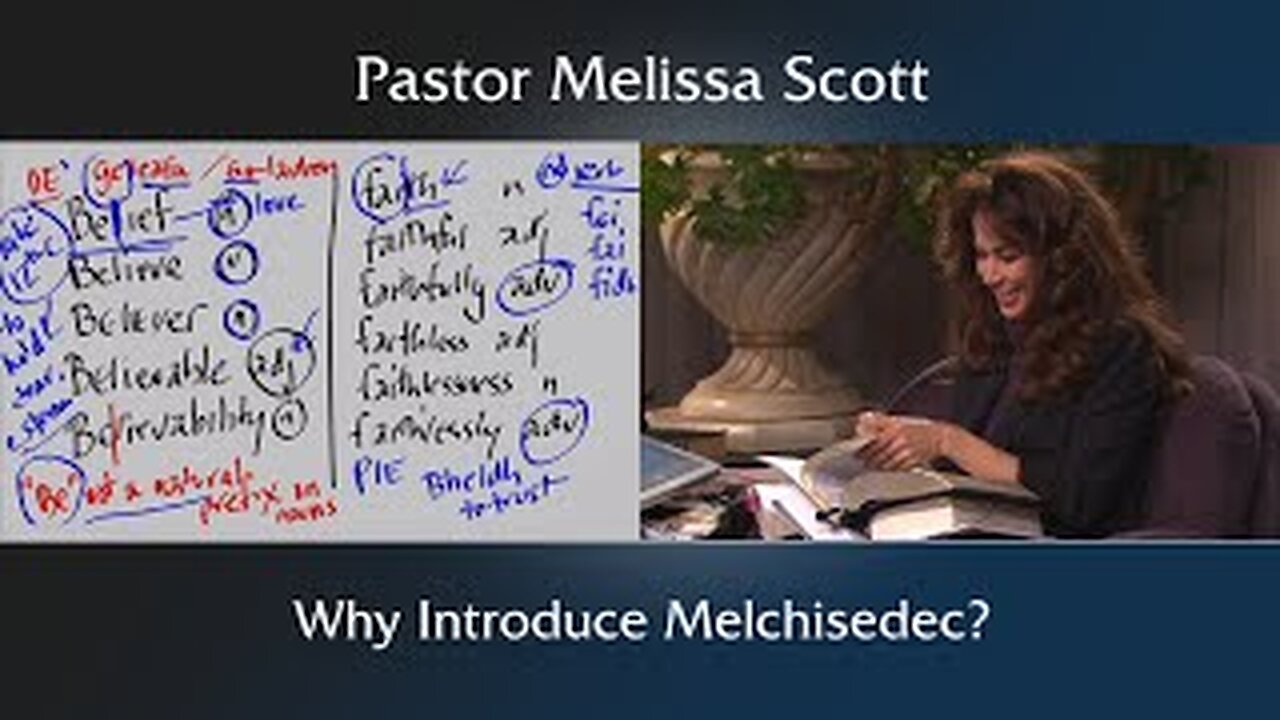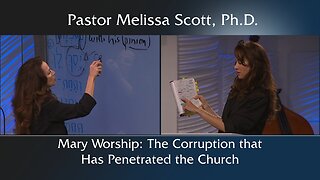Premium Only Content

Hebrews 7 Why Introduce Melchisedec? - Hebrews #61
Pastor Scott crystalizes the argument and purpose of why the writer of Hebrews introduces Melchisedec and how understanding chapter 7 is pivotal to understanding the rest of the book. She compares the three priesthoods: Christ, the Levites and Melchisedec.
Pastor Melissa Scott teaches from Faith Center in Glendale, CA. For more of Pastor Scott's teaching 24x7, visit her website at https://www.pastormelissascott.com.
Call 1-800-338-3030 24x7 to let Pastor Scott know you watched the teaching. She appreciates messages and reads them often during live broadcasts.
Follow @Pastor_Scott on Twitter and visit her official Facebook page @Pastor.M.Scott
Download Pastor Scott's "Understand the Bible" app for iPhone, iPad and iPod at the Apple App Store:
https://apps.apple.com/us/app/pastorscott/id598151650
and for Android devices:
https://play.google.com/store/apps/details?id=com.pastormelissascott.www.pastorscott&hl=en_US
Pastor Scott can also be seen 24x7 on Roku on the "Understand the Bible?" channel. For more information visit https://www.pastormelissascottonroku.com
Pastor Mellissa Scott exposed the truth about Why Introduce Melchisedec?
Hebrews 7 King James Version
1 For this Melchisedec, king of Salem, priest of the most high God, who met Abraham returning from the slaughter of the kings, and blessed him;
2 To whom also Abraham gave a tenth part of all; first being by interpretation King of righteousness, and after that also King of Salem, which is, King of peace;
3 Without father, without mother, without descent, having neither beginning of days, nor end of life; but made like unto the Son of God; abideth a priest continually.
4 Now consider how great this man was, unto whom even the patriarch Abraham gave the tenth of the spoils.
5 And verily they that are of the sons of Levi, who receive the office of the priesthood, have a commandment to take tithes of the people according to the law, that is, of their brethren, though they come out of the loins of Abraham:
6 But he whose descent is not counted from them received tithes of Abraham, and blessed him that had the promises.
7 And without all contradiction the less is blessed of the better.
8 And here men that die receive tithes; but there he receiveth them, of whom it is witnessed that he liveth.
9 And as I may so say, Levi also, who receiveth tithes, payed tithes in Abraham.
10 For he was yet in the loins of his father, when Melchisedec met him.
11 If therefore perfection were by the Levitical priesthood, (for under it the people received the law,) what further need was there that another priest should rise after the order of Melchisedec, and not be called after the order of Aaron?
12 For the priesthood being changed, there is made of necessity a change also of the law.
13 For he of whom these things are spoken pertaineth to another tribe, of which no man gave attendance at the altar.
14 For it is evident that our Lord sprang out of Juda; of which tribe Moses spake nothing concerning priesthood.
15 And it is yet far more evident: for that after the similitude of Melchisedec there ariseth another priest,
16 Who is made, not after the law of a carnal commandment, but after the power of an endless life.
17 For he testifieth, Thou art a priest for ever after the order of Melchisedec.
18 For there is verily a disannulling of the commandment going before for the weakness and unprofitableness thereof.
19 For the law made nothing perfect, but the bringing in of a better hope did; by the which we draw nigh unto God.
20 And inasmuch as not without an oath he was made priest:
21 (For those priests were made without an oath; but this with an oath by him that said unto him, The Lord sware and will not repent, Thou art a priest for ever after the order of Melchisedec:)
22 By so much was Jesus made a surety of a better testament.
23 And they truly were many priests, because they were not suffered to continue by reason of death:
24 But this man, because he continueth ever, hath an unchangeable priesthood.
25 Wherefore he is able also to save them to the uttermost that come unto God by him, seeing he ever liveth to make intercession for them.
26 For such an high priest became us, who is holy, harmless, undefiled, separate from sinners, and made higher than the heavens;
27 Who needeth not daily, as those high priests, to offer up sacrifice, first for his own sins, and then for the people's: for this he did once, when he offered up himself.
28 For the law maketh men high priests which have infirmity; but the word of the oath, which was since the law, maketh the Son, who is consecrated for evermore.
King James Version
Public Domain
-
 58:58
58:58
Pastor Melissa Scott, Ph.D.
8 days agoMary Worship: The Corruption that Has Penetrated the Church
2562 -
 1:01:05
1:01:05
Trumpet Daily
1 day ago $4.15 earnedGermany Started Two World Wars and Now Wants Nuclear Weapons - Trumpet Daily | Mar. 7, 2025
14K32 -
 57:07
57:07
Stephen Gardner
18 hours ago🚨BREAKING: Musk STUNS even Trump with LATEST FRAUD DISCOVERY!!
118K263 -
 2:26:47
2:26:47
FreshandFit
13 hours agoRatchet Chick Gets Kicked Out "Gracefully" For THIS...
123K162 -
 2:05:17
2:05:17
TimcastIRL
16 hours agoDemocrat ACTBLUE In CHAOS, Theories Over DOGE Cutting SLUSH FUND Go Wild w/Hotep Jesus | Timcast IRL
255K232 -
 1:11:43
1:11:43
Roseanne Barr
21 hours ago $59.30 earned"They are all Monsters" | The Roseanne Barr Podcast #89
121K157 -
 9:26:16
9:26:16
Dr Disrespect
1 day ago🔴LIVE - DR DISRESPECT - WARZONE - PR ATTEMPTS
165K33 -
 3:48:30
3:48:30
Akademiks
16 hours agoDay 1/30. Lebron checks stephen a Smith. TOry Lanez talking CRAZY asf. Lil Ronnie K*Ilers Caught
105K8 -
 3:47:54
3:47:54
I_Came_With_Fire_Podcast
20 hours agoDEPARTMENT OF EDUCATION AXED | GAZA ULTIMATUM
92.8K29 -
 2:16:53
2:16:53
FreshandFit
17 hours agoCall-In Show
112K14